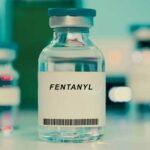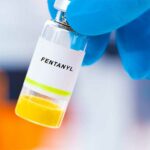Fentanyl is a potent synthetic opioid analgesic used to treat severe pain. It is also produced illegally and sold in powder form or mixed with other drugs. Fentanyl is dangerous because only a small amount, about 2 mg, is needed to produce a fatal overdose.
Someone suffering a fentanyl overdose may experience trouble breathing, clammy skin, and loss of consciousness. An opioid overdose can be reversed with Narcan (naloxone), however, fentanyl may require multiple doses.
If you notice or suspect signs of an overdose, it is crucial to seek medical help immediately.
Fentanyl Overdose Signs
Fentanyl can cause a life-threatening reaction known as respiratory depression. Respiratory depression can cause difficulty breathing, which can affect oxygen traveling to the brain. If the brain is deprived of oxygen for too long, it can cause a coma, brain damage, or death.
Warning signs of an opioid overdose may include:
- pinpoint pupils
- clammy skin
- bluish skin
- shallow breathing
- confusion
About 2 mg of fentanyl can cause a lethal overdose, which is equal to about a few grains. It can be difficult to detect fentanyl in other drugs until it is too late. Many street drugs are laced with fentanyl, which can cause an unintentional overdose.
Counterfeit Pills
Drug trafficking organizations also mix fentanyl into prescription drugs to produce counterfeit pills. Although they are marketed to look like prescription pills, counterfeit pills are illegal drugs and may consist of mostly fentanyl and additives.
Counterfeit pills are often made to look like:
- oxycodone
- hydrocodone
- Adderall
- methamphetamine
- Xanax
Someone intending to take a stimulant drug, like Adderall or methamphetamine, may not have an opioid tolerance and can suffer a fatal overdose if the drug contains fentanyl.
How Common Are Fentanyl Overdoses?
Fentanyl-related overdoses have become increasingly more common over the past decade. According to the Centers for Disease Control and Prevention (CDC), the number of overdose deaths was 12 times higher in 2019 than in 2013.
Additional CDC overdose death rates include the following information:
- fentanyl overdose death counts increased 16% between 2018-2019
- fentanyl was associated with over 36,000 fatalities in 2019
- synthetic opioids were involved in 73% of opioid-related overdose deaths in 2019
- the majority of fentanyl-related deaths involve illicit fentanyl
Along with fentanyl, other synthetic opioids, like carfentanil, have also been involved in overdose deaths. Carfentanil is about 100 times more potent than fentanyl and 10,000 times stronger than morphine.
Fentanyl Overdose Treatment
If you suspect signs of overdose, call 9-1-1 and wait for medical help to arrive. In the meantime, you can administer naloxone if available. Naloxone (Narcan) can reverse the effects of an opioid overdose if given in time.
Naloxone is an opioid antagonist that attaches to opioid receptors and blocks the effects of opioids.
However, fentanyl is up to 100 times more potent than other opioids, including morphine, and may require multiple doses of naloxone.
Emergency responders will give additional Narcan, if necessary, and may provide transportation to a hospital for monitoring.
Is Fentanyl Addictive?
The Drug Enforcement Administration classifies fentanyl as a Schedule II controlled substance in the United States. Long-term drug abuse involving fentanyl can lead to a substance use disorder (SUD).
Even if fentanyl is taken under the care of a prescribing doctor, you can develop dependence and addiction. Repeated substance abuse can lead to intense cravings and compulsive drug use, regardless of the consequences.
If you develop a dependence, you may experience withdrawal symptoms when you stop taking the drug.
Fentanyl withdrawal symptoms may include:
- muscle pain
- difficulty sleeping
- diarrhea
- vomiting
- goosebumps
Withdrawal symptoms are not life-threatening but they can lead to relapse and overdose if untreated. Medical detox can provide around-the-clock supervision and medication to ease severe symptoms.
Effects Of Fentanyl Abuse
Similar to other opioids, fentanyl activates opioid receptors and releases a flood of dopamine in the central nervous system. Fentanyl may cause a rapid rush of euphoria along with pain relief but it can also cause numerous adverse effects.
Side-effects of fentanyl may include:
- drowsiness
- dizziness
- constipation
- nausea
- vomiting
- confusion
Fentanyl is a depressant drug that slows breathing, heart rate, and blood pressure. Taking too much or combining it with other depressants can enhance its effects and increase the risk of opioid overdose.
Fentanyl Addiction Treatment
If you or a loved one is struggling with opioid addiction, professional treatment is one of the most effective forms of overdose prevention. Inpatient and outpatient treatment centers offer personalized treatment to help you learn more about addiction and how to live drug-free.
Depending on your treatment plan, your treatment options may include:
- behavioral therapy
- group therapy
- individual counseling
- family therapy
- medication-assisted treatment (MAT), including buprenorphine and methadone
- support groups
- mindfulness activities
At Northeast Addictions Treatment Center, we offer a wide range of outpatient services for opioid addiction and co-occurring mental illness. To learn more about our addiction treatment programs, please contact us today.
Sources
Written by
Northeast Addition Editorial Team
©2024 Northeast Addition Center | All Rights Reserved
This page does not provide medical advice.




